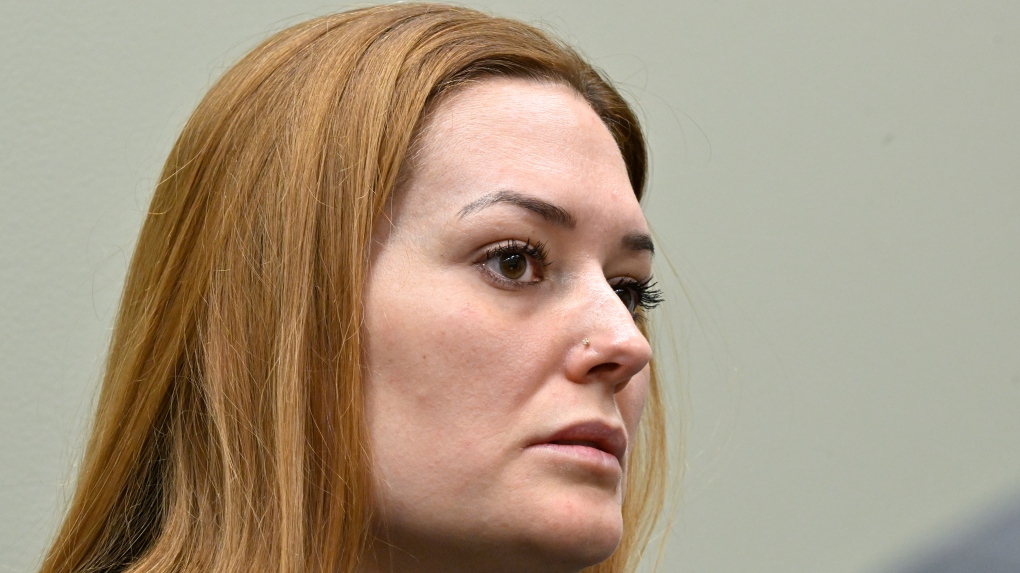‘They could have been found in time’: Que. mother of slain girls speaks after coroner’s report

[ad_1]
Reading through the coroner’s report on Tuesday, Amélie Lemieux felt vindicated.
The 85 pages echoed what she “always knew”: that Quebec provincial police made a series of missteps when searching for her daughters.
Norah, 11, and Romy, 6, were abducted and killed by their father in July 2020. Since then, Lemieux has held steady in her belief that police acted too slowly following their disappearance — and coroner Luc Malouin agrees.
“The coroner’s report and I have been fighting for the truth for three years,” Lemieux told CTV News Wednesday in an interview, which has been translated from French.
“In effect, it just reassures me to say, ‘Okay, you’re not the only one to think so, or indeed you weren’t. You didn’t come out of nowhere, you know — you were right.'”
“I always knew that my daughters could have been alive, that they could have been found in time.”
In his report published Tuesday, Malouin said though he doesn’t blame them for the deaths, the Sureté du Québec (SQ) waited too long to search for the girls and issue an Amber Alert after they vanished on July 8, 2020.
Their father, Martin Carpentier, abducted his daughters after getting into a car crash with them near Saint-Apollinaire, southwest of Quebec City.
Norah and Romy’s bodies were discovered in a forest on July 11. Carpentier’s body was found more than a week later; he took his own life.
 A card distributed by the family depicts Romy, left, and Norah Carpentier, at the funeral home in Levis, Que., Monday, July 20, 2020. Romy and Norah Carpentier were found dead in Saint-Apollinaire, Quebec. A manhunt was launched to find the missing father of the two deceased girls. THE CANADIAN PRESS/Jacques Boissinot
A card distributed by the family depicts Romy, left, and Norah Carpentier, at the funeral home in Levis, Que., Monday, July 20, 2020. Romy and Norah Carpentier were found dead in Saint-Apollinaire, Quebec. A manhunt was launched to find the missing father of the two deceased girls. THE CANADIAN PRESS/Jacques Boissinot
Lemieux said she still asks herself “why Martin did it.”
“I think humans can be surprising in many ways, and it can still be difficult today.”
She and Carpentier were separated at the time of the tragedy and seeking a divorce. Family and friends testified that Carpentier had grown increasingly paranoid about losing custody of his daughters.
‘NOTHING WILL BRING THEM BACK’
The coroner’s inquest also found the SQ didn’t request search assistance from either Quebec City police or wildlife protection officers.
In his report, Malouin recommended increased partnerships with other police forces, wildlife protection officers and volunteer search group the Association québécoise des bénévoles en recherche et sauvetage (AQBRS).
He also requested police initiate media alerts promptly in disappearance cases, “especially those involving children under the age of 13.”
It’s a recommendation Lemieux hopes police take to heart.
“I think that a child under 13 who isn’t in bed by midnight isn’t normal. Of course, we do everything we can, but we know that things can change very quickly. We have to find these children as quickly as possible. So, yes, we put our pride aside, and we deploy, and we look for everyone around us who can help us,” she said.
 Amelie Lemieux, mother of Romy and Norah Carpentier, sits in the courtroom for a coroner’s inquest into the deaths of her daughters, Monday, February 13, 2023 in Quebec City. THE CANADIAN PRESS/Jacques Boissinot
Amelie Lemieux, mother of Romy and Norah Carpentier, sits in the courtroom for a coroner’s inquest into the deaths of her daughters, Monday, February 13, 2023 in Quebec City. THE CANADIAN PRESS/Jacques Boissinot
In a press release issued Tuesday, the SQ said it “welcomes” the coroner’s recommendations, noting that its search and rescue training has already been “enhanced” and updates were made to how the Ambert Alert system is used, in addition to other improvements.
“After each operation, we analyze our actions to identify what worked well and what needs to be improved, and that’s what we did following the Amber Alert in July 2020,” reads a statement from Chief Insp. Patrick Marchand, director of emergency measures at the SQ.
But no amount of improvements can change the past, says Lemieux.
“There’s nothing that will bring them back,” she said. “I just think it’s a shame that it took two human lives to realize we could have done better.”
Lemieux and her legal team have filed preliminary proceedings against the SQ.
“I’m going to check with the Quebec Attorney General to see if we can come to an amicable agreement,” she explained. “I think we will. After that, the case is closed.”
In the meantime, she’s focused on healing.
“I’ve got an established routine here, but it’s still very difficult. I have a lot of blank memories, I have a lot of fears, flashes. You know, I work regularly with doctors to try to treat all that, but it’s still very present and very heavy.”
With files from CTV Montreal’s Stéphane Giroux.
[ad_2]